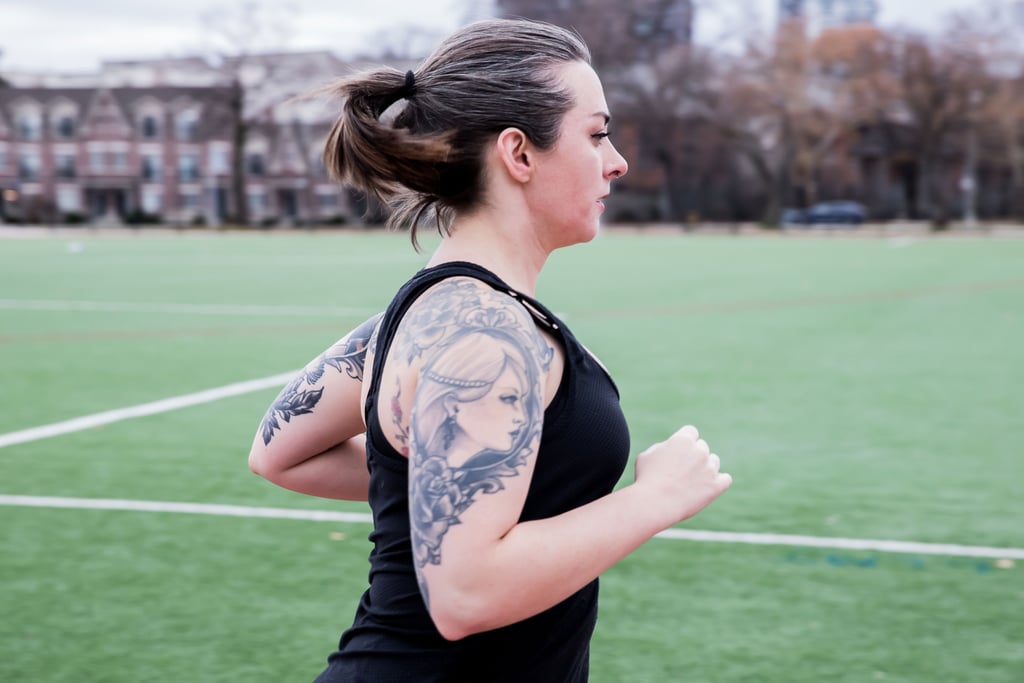You did it! You reached your goal weight, and you want to make sure all your hard work doesn't go to waste by being able to maintain it. Whether you were running to lose weight [1] or you're looking to take up running now, we talked to certified trainers and registered dietitians, and here's what they had to say about running for weight-loss maintenance.

Can Running Help Me Maintain My Weight Loss?

Running can absolutely help you maintain weight loss by burning calories, said ACE-certified trainer and weight-loss health coach Rachel MacPherson [3]. "As long as you aren't consuming more than you're burning, you should be able to maintain your weight this way," she said.
"To maintain your weight loss, you have to keep up the same amount of activity (calorie output) used to lose the weight, or slowly reduce the amount of activity over time," to give your body time to adjust, explained exercise physiologist and NASM-certified personal trainer, Krissi Williford, MS, from Xcite Fitness [3]. She said that running helps maintain your calorie expenditure. She also noted that running is also excellent cardiovascular exercise for heart health and for mental health.
It's also important to keep in mind that although it 100-percent will help you burn calories and keep you moving, NASM-certified personal trainer Jared Hamilton said, "You're not going to be building much muscle." Having more muscle mass means your body is burning more calories when it's at rest, which can help with weight-loss maintenance (more on that later).
How Many Times a Week Should I Run to Maintain Weight Loss

"I wouldn't base an entire exercise program off of running alone," said Jared. If you enjoy running, he suggested to aim for one to three 20- 30-minute runs per week.
Krissi added that if you're doing a variety of activities like running, lifting weights, yoga, and other fitness classes, it has to fall into place with the rest of your activity so you don't overtrain. "Overtraining [4] is the fastest way to injury and inactivity, which doesn't support your goals," she said.
Overdoing it can also make you ravenous, warned Rachel, so make sure you're not running so much that increased hunger leads to overeating, which can actually cause weight gain. "Performing HIIT workouts with your running such as sprints or walk/runs can burn more calories over the next several hours, and also has been shown to blunt hunger [5]."
Is Running the Best Way to Maintain Weight Loss?

If you absolutely love running and want to use it to maintain your weight loss, NASM- and ACE-certified trainer Holly Roser [6] said you always want to mix up your workouts so your body doesn't get comfortable burning the same amount of calories each day. Alter your runs by increasing your speed, the incline, or distance. And don't just run! Holly said the best plateau-buster is mixing up your cardio every other week. "Try kickboxing one week, swimming the next, tennis, or uphill sprints," she suggested.
Krissi, Rachel, and Jared agree that cardio can help burn calories, but it should be used in conjunction with strength training. Rachel recommends full-body training, since building muscle will rev up your metabolism [7]. She said that although running is a great way to burn calories and keep your heart healthy, solely doing sustained cardio "can actually decrease muscle mass (it is catabolic meaning muscle-deteriorating), and can slow the metabolism."
For strength training, Jared recommends doing compound exercises [8], which are multi-joint movements that work groups of large muscle. This includes exercises such as squats, deadlifts, lunges, bench press, step-ups, pull-ups, and push-ups.
"Not only are you going to burn more calories while working out, but because you're building lean muscle tissue, your metabolism is going to increase, and you'll be burning more calories even after you leave the gym," Jared said.
Above all, Krissi said that all exercise can help with weight maintenance, but that it's important that you love it. "If you don't enjoy the activity you're doing, then it can become a barrier to your success, and it will be easy to make excuses as to why you can't do your exercise that day," she said.
How Does Diet Affect Weight-Loss Maintenance?

While running can burn calories, the average 30-minute run only burns about 300 [9] calories, depending on your weight and the intensity of your workout. If you end up overeating your daily calories, even after doing that 300-calorie-burning run, that can translate to weight gain.
Krissi added that "diet and food are the foundation of any change in your body and the maintenance of that change, especially weight loss." As the saying goes, you can't outwork a bad diet. Eating a healthy, nutrient-dense diet will allow you to perform well, to think clearly, to stay motivated, and to feel satisfied.
Be sure to consume enough to feel good and to have productive workouts, but not too much that you gain weight, Rachel added. It's also very important not to undereat. Without enough food for survival (including our normal daily functions), your body will send signals to conserve calories, slowing down your metabolism [10], explained registered dietitian and CSCS-certified trainer Lisa Bunn. The best practice is to focus on whole, unprocessed foods [11] to fuel your workouts, said registered dietitian and nutritionist Maddie Kinzly MS, RD. Find a diet that you enjoy, that's sustainable, and burn extra calories through activity.
Tracking your calories and macro intake can be helpful, mentioned registered dietitian Emily Tills, MS, CDN. It's important to eat a balanced diet, and tracking ensures that you're getting enough carbs, protein, and healthy fats. If you're not sure what your intake should be, meet with a registered dietitian.
It also allows you to see how much you're eating and assess if you need to make changes. The 80/20 approach [12] is a sustainable way to eat since it allows for 80 percent of your day being clean and unprocessed, and 20 percent are foods you enjoy that may not be the healthiest.
What If I'm Running and Slowly Regaining the Weight?

Don't skimp on strength training [13], Holly said. "In order to lose weight and keep it off, try to do resistance training three to four times a week, and run two to three times a week." She added that muscle is active tissue and helps you lose weight while your body is at rest, because it's burning calories for you. The more muscle you have on your body, the more calories you'll burn at rest, and the less body fat you'll have.
Holly, Krissi, and Emily agree that if you're gaining weight, you're going to need to look at your calorie intake to ensure that you're not in a calorie surplus [14]. If you're tracking, it'll be easy to see if you've been consuming extra calories, and you'll be able to tweak your intake to see results.
If you actually love running, find new ways to challenge yourself [15]. Krissi said to try sprints, running hills or on mountain terrain, running in a pool, running outside if you're used to a treadmill, and even running sideways or backward for fun.
Rachel said that stress levels can also play a role. Running puts stress on the body, and if mixing up your runs doesn't work, she suggested going for walks instead [16]. "Walking helps to lower your body's overall stress load and lower cortisol levels. Cortisol is a stress hormone [17] that makes it more difficult to lose weight and can cause weight gain," Rachel said. The combination of walking and strength training can help you lose that bit of added weight and help you maintain weight while lowering stress levels.